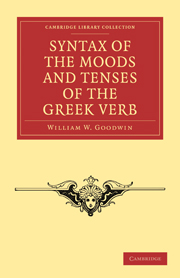Book contents
- Frontmatter
- PREFACE TO THE SECOND EDITION
- Contents
- CHAPTER I GENERAL VIEW OF THE MOODS
- CHAPTER II USE OF THE TENSES
- CHAPTER III THE PARTICLE ῞AN
- CHAPTER IV USE OF THE MOODS
- CHAPTER V THE INFINITIVE
- CHAPTER VI THE PARTICIPLE
- CHAPTER VII VERBAL ADJECTIVES IN -τέος
- APPENDIX I
- APPENDIX II
- INDEX TO EXAMPLES
- ENGLISH INDEX
- GREEK INDEX
CHAPTER III - THE PARTICLE ῞AN
Published online by Cambridge University Press: 07 September 2011
- Frontmatter
- PREFACE TO THE SECOND EDITION
- Contents
- CHAPTER I GENERAL VIEW OF THE MOODS
- CHAPTER II USE OF THE TENSES
- CHAPTER III THE PARTICLE ῞AN
- CHAPTER IV USE OF THE MOODS
- CHAPTER V THE INFINITIVE
- CHAPTER VI THE PARTICIPLE
- CHAPTER VII VERBAL ADJECTIVES IN -τέος
- APPENDIX I
- APPENDIX II
- INDEX TO EXAMPLES
- ENGLISH INDEX
- GREEK INDEX
Summary
§ 36. The adverb ἄν (Epic κέ, Doric κά) has two uses, which must be carefully distinguished.
1. In one use, it denotes that the action of the verb to which it is joined is dependent upon some condition, expressed or implied. This is its force with the secondary tenses of the Indicative, and with the Optative, Infinitive, and Participle: with these it forms an apodosis, and belongs strictly to the verb.
2. In its other use, it is joined regularly to εἰ, if, and to all relatives and temporal particles, (and occasionally to the final particles ὡς, ὅπως, and ὄφρα,) when these words are followed by the Subjunctive. Here it seems to belong entirely to the relative or particle, with which it often coalesces, as in ἐάν, ὅταν, ἐπειδάν.
Remark 1. The rules, § 36, 1, 2, include only the constructions which are in good use in Attic Greek. For the Epic use of ἄν with the Subjunctive in apodosis, see § 38, 2; for ἄν with the Future Indicative, see § 37, 2.
Remark 2. There is no word or expression in English which can be used to translate ἄν. In its first use (§ 36, 1) we express it by the mood of the verb which we use; as βούλοιτο ἄν, he would wish.
- Type
- Chapter
- Information
- Syntax of the Moods and Tenses of the Greek Verb , pp. 54 - 64Publisher: Cambridge University PressPrint publication year: 2010First published in: 1867



